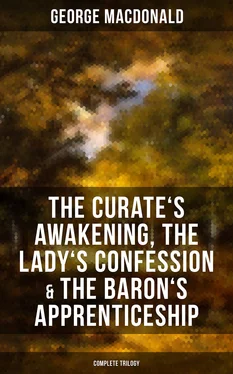"But who is to fix what is reasonable?" asked Drew.
"The man himself, thinking in the presence of Jesus Christ. There is a holy moderation which is of God."
"There won't be many fortunes—great fortunes—made after that rule, Mr. Polwarth."
"Very few."
"Then do you say that no great fortunes have been righteously made?"
"If RIGHTEOUSLY means AFTER THE FASHION OF JESUS CHRIST.—But I will not judge: that is for the God-enlightened conscience of the man himself to do—not for his neighbour's. Why should I be judged by another man's conscience?—But you see, Mr. Drew,—and this is what I was driving at—that you have it in your power to SERVE God, through the needs of his children, all the working day, from morning to night, so long as there is a customer in your shop."
"I do think you are right, sir," said the linen-draper. "I had a glimpse of the same thing the other night myself. And yet it seems as if you spoke of a purely ideal state—one that could not be realised in this world."
"Purely ideal or not, one thing is certain: it will never be reached by one who is so indifferent to it as to believe it impossible. Whether it may be reached in this world or not, that is a question of NO consequence; whether a man has begun to REACH AFTER it, is of the utmost awfulness of import. And should it be ideal, which I doubt, what else than the ideal have the followers of the ideal man to do with?"
"Can a man reach anything ideal before he has God dwelling in him—filling every cranny of his soul?" asked the curate with shining eyes.
"Nothing, I do most solemnly believe," answered Polwarth. "It weighs on me heavily sometimes," he resumed, after a pause, "to think how far all but a few are from being able even to entertain the idea of the indwelling in them of the original power of their life. True, God is in every man, else how could he live the life he does live? but that life God keeps alive for the hour when he shall inform the will, the aspiration, the imagination of the man. When the man throws wide his door to the Father of his spirit, when his individual being is thus supplemented—to use a poor miserable word—with the individuality that originated it, then is the man a whole, healthy, complete existence. Then indeed, and then only, will he do no wrong, think no wrong, love perfectly, and be right merry. Then will he scarce think of praying, because God is in every thought and enters anew with every sensation. Then will he forgive, and endure, and pour out his soul for the beloved who yet grope their way in doubt and passion. Then every man will be dear and precious to him, even the worst, for in him also lies an unknown yearning after the same peace wherein he rests and loves."
He sat down suddenly, and a deep silence filled the room.
CHAPTER XXVIII.
A SHOP IN HEAVEN.
Table of Contents
"Uncle," said Rachel, "may I read your visions of the shops in heaven?"
"Oh no, Rachel. You are not able to read to-night," said her uncle deprecatingly.
"I think I am, uncle. I should like to try. It will let the gentlemen see what you WOULD think an ideal state of things.—It is something, Mr. Wingfold, my uncle once dictated to me, and I wrote down just as he said it. He can always do better dictating than writing, but this time he was so ill with asthma that he could not talk much faster than I could write; and yet to be so ill I never saw him show so little suffering; his thinking seemed to make him forget it.—Mayn't I read it, uncle? I know the gentlemen would like to hear it."
"That we should," said both men at once.
"I will fetch it you then," said Polwarth, "if you will tell me where to find it."
Rachel gave him the needful directions, and presently he brought a few sheets of paper, and handed them to her.
"This is no dream, Mr. Wingfold," he said. "It is something I thought fairly out before I began to dictate it. But the only fit form I could find for it was that of a vision—like the Vision of Mirza, you know.—Now read, Rachel, and I will hold my tongue."
After a little arranging of the sheets, Rachel began. She read not without difficulty, but her pleasure in what she read helped her through.
"'And now, said my guide to me, I will bring thee to a city of the righteous, and show thee how they buy and sell in this the kingdom of heaven. So we journeyed a day and another day and half a day, and I was weary ere we arrived thither. But when I saw the loveliness of the place, and drew in the healing air thereof, my weariness vanished as a dream of the night, and I said, IT IS WELL.—I may not now speak of the houses and the dress and the customs of the dwellers therein, save what may belong to the buying and selling of which I have spoken. Gladly would I tell of the streams that went, some noiselessly gliding, others gurgling, some sweeping, some rushing and roaring, through every street, all issuing from one right plenteous fountain in the middle of the city, so that the ear was for ever filled with the sound of many waters all the day, ceasing when the night came, that silence might have its perfect work upon the soul. Gladly too would I tell of the trees and flowers and grass that grew in every street along the banks of the rivers. But I must withhold.
"'After I had, I know not for how long, refreshed my soul with what it was thus given, me to enjoy,—for in all that country there is no such thing as haste, no darting from one thing to another, but a calm eternal progress in which unto the day the good thereof is sufficient—one great noon-day, my conductor led me into a large place, such as we would call a shop here, although the arrangements were different, and an air of stateliness dwelt in and around the house. It was filled with the loveliest silken and woollen stuffs, of all kinds and colours, a thousand delights to the eye—and to the thought also, for here was endless harmony, and no discord.
"'I stood in the midst, and my guide stood by me in silence; for all the time I was in the country, he seldom spoke to me save when first I asked of him, and yet he never showed any weariness, and often a half-smile would dwell for a moment upon his countenance.
"'And first I watched the faces of them that sold; and I could read therein—for be it understood that, according to the degree of his own capacity, a man there could perfectly read the countenance of every neighbour, that is, unless it expressed something that was not in himself—and I could read in them nothing of eagerness, only the calm of a concentrated ministration. There was no seeking there, but a strength of giving, a business-like earnestness to supply lack, enlivened by no haste, and dulled by no weariness, brightened ever by the reflected content of those who found their wants supplied. As soon as one buyer was contented they turned graciously to another, and gave ear until they perfectly understood with what object he had come to seek their aid. Nor did their countenances change utterly as they turned away, for upon them lingered the satisfaction as of one who hath had a success, and by degrees melted into the supervening content.
"'Then I turned to watch the countenances of them that bought.—And there in like manner I saw no cupidity and no meanness. They spake humbly, yet not because they sought a favour, but because they were humble, for with their humility was mingled the confidence of receiving that they sought. And truly it was a pleasure to see how everyone knew what his desire was, making his choice readily and with decision. I perceived also that everyone spoke not merely respectfully, but gratefully, to him who served him. And at meeting and parting such kindly though brief greetings passed as made me wonder whether every inhabitant of such a mighty city could know every other that dwelt therein. But I soon saw that it came not of individual knowledge, but of universal faith and all-embracing love.
Читать дальше












